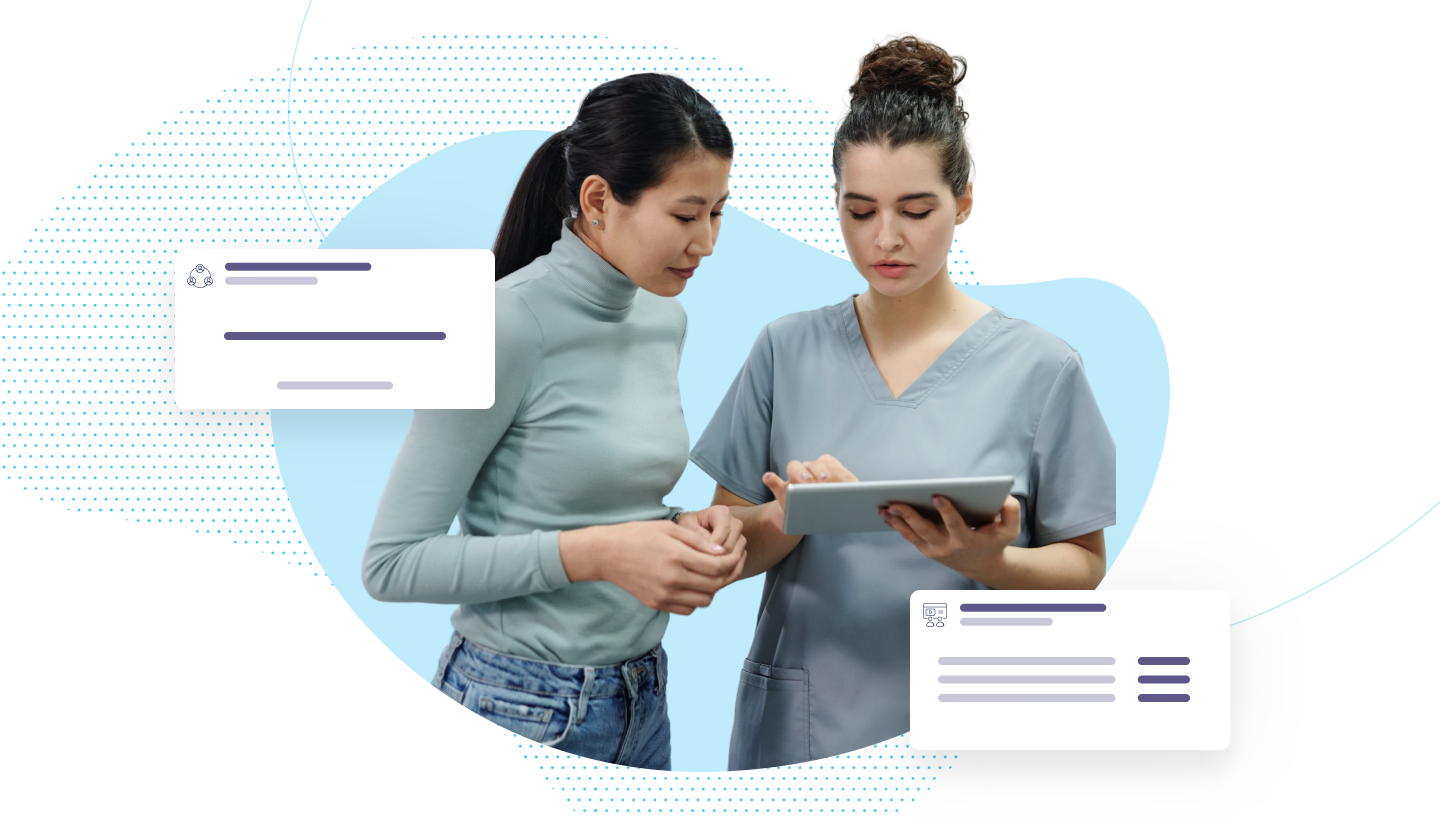Today, in healthcare, there are two-fold challenges: tightening compliance demands and widening skills gaps. You, L&D teams, are the architects of smarter learning ecosystems that drive readiness, meet regulations, and empower real-world care. And while there’s a lot more automation, the blueprints for safer systems, stronger teams, and smarter compliance won’t come to life without your expertise.
There’s a lot to do: training modules, completion tracking, audit prep, reporting—not to mention planning for what tomorrow will need. It’s nothing short of a herculean task to protect patients, motivate staff, and keep your organization compliant in a space that’s not slowing down. But just like you’re ramping up, so are the systems that will help you manage it all.
See an LMS built for healthcare: Absorb LMS solutions
Driven by AI-powered personalization, mobile-first training, and the need for smarter compliance, the healthcare LMS market is projected to more than double by 2035, reaching $6.5 billion. For you, this means there’s a lot of work going into making sure you’re set up for success today and tomorrow.
To compete today, you need a modern LMS that handles logistics automatically, so you can focus on learning and strategy. Deliver engaging, role-relevant training while the system manages compliance behind the scenes, from credential tracking and renewal alerts to audit-ready reports.
The stakes are rising. Beyond meeting regulations, high-performing healthcare organizations are building knowledgeable, motivated teams committed to continuous learning. Your LMS should help you do the same: be innovative, intuitive, and ready to scale.
Compliance is complex, but your LMS doesn’t need to be
Healthcare organizations face a maze of regulatory requirements—HIPAA, OSHA, CME, CEU renewals, and more. Each comes with its own set of deadlines, documentation standards, and audit expectations. In the past, keeping up meant juggling spreadsheets, chasing certificates, and manually tracking learner progress across departments. But things are changing fast.
With a modern healthcare LMS, you can bring order to the seemingly never-ending chaos. It’ll help you deliver care with the highest level of integrity, supporting 100% compliance across security standards and regulations. Plus, you’ll have access to up-to-date training materials on topics across every discipline. See how Absorb LMS MedTrainer integration delivers 500+ courses maintained by more than 300+ subject matter experts, spanning both clinical and non-clinical functions.
The growing need for digital learning in healthcare
“As the healthcare system braces for continued workforce shortages and as care delivery increasingly depends on the strength of non-physician providers, the time for a new learning paradigm is now. We cannot afford to leave clinical quality to chance or treat education as an afterthought.” — Forbes Business Council, “Future-Proofing the Healthcare Workforce with LMS Technology,” June 5, 2025
Digital learning in healthcare has evolved beyond pandemic-era tele-health and toward AI-powered training ecosystems.
We’ve entered a new era of AI-powered learning ecosystems—where training is smarter, faster, and built for the way healthcare teams work. With it, there’s a growing emphasis on resilience training for healthcare organizations.
Today’s healthcare LMS platforms are designed for:
- Mobile-first training and training-on-the-go that fits into clinical workflows
- Personalized learning paths (AI-driven) that adapt to roles, performance, and pace
- Scalable delivery across locations, shifts, and job functions
- Seamless integrations that ensure data syncing and accurate reporting
- Specific healthcare content libraries that keep up with regulatory changes
- Microlearning and gamification to increase engagement
Your LMS should be a strategic shift toward a more resilient, engaged, and future-ready healthcare team.
Check out Absorb LMS, AI-powered to be an essential part of your healthcare organization’s toolkit.
Key LMS features that support healthcare accreditation
Accreditation is more than merely meeting the minimum standards. It’s about proving readiness, building trust, and scaling learning across every department.
That’s where modern healthcare LMS features deliver because they’re built to support accreditation workflows end-to-end. An AI-powered LMS is a key component of your healthcare organization’s learning toolkit, providing automation, real-time visibility, and strategic insight.
As a minimum, it should deliver training, but it should also connect the dots between learning, credentialing, and compliance documentation. And these tools help you do just that:
- Automated credential tracking: Monitor CEUs, licenses, and certifications in real time with zero manual effort.
- Integrated CEU workflows: Assign, track, and report continuing education credits across roles and departments.
- Compliance and training for external learners: Ensure partners, distributors, and vendors get appropriate training and are compliant—all in a centralized platform.
- Auto-renewal reminders: Ensure certifications and licenses are renewed on time with built-in alerts.
- Audit-ready documentation: Generate reports instantly to satisfy regulatory bodies and internal stakeholders.
- HRIS/API integrations: Sync learner data across systems for seamless compliance and workforce planning.
- Secure document storage: Keep certificates, transcripts, and training records organized and accessible.
Check out how Absorb LMS helped deliver 24/7 training at Michael Garron hospital.
AI-powered analytics and predictive compliance: Smarter oversight, less guesswork
Compliance should anticipate what’s next, not just track what’s been done. With intelligent automation and predictive insights, you can move from a reactive to a proactive approach.
- Predictive dashboards are powerful because they surface learners at risk of non-compliance before deadlines hit.
- Automated alerts notify admins of expiring credentials, overdue training, or audit gaps.
- Natural language queries (like Absorb LMS Intelligent Assist) let you ask things like, “Show me all users who didn’t complete HIPAA training”—and get instant, actionable reports.
- Behavioral analytics track learner engagement and flag patterns that may signal future compliance issues.
- AI-driven recommendations suggest refresher modules or next-step certifications based on learner performance and role.
More than data, you get smart decision support!
Read the case study for Rho, a clinical research company that needed to scale its training platform in a big way. With Absorb LMS (including Absorb Engage and Absorb Analyze), it scaled global training across 25+ countries, achieved 97% training compliance, and simplified onboarding and reporting.
While you’re at it, see the case study for Children’s Hospital of Philadelphia. Their radiology department decided to develop a revolutionary education program and used Absorb LMS to develop RADIAL, a centralized, AI-driven learning system. With it, they trained nearly 180 radiology trainees, and used Absorb Analyze to drive advancements like AI-based tools for personalized, just-in-time learning.
And lastly, check out the story for Juv’ae. This national aesthetics network supports over 460 cosmetic nurses across Australia. With Absorb LMS, they turned their decentralized training into a scalable, branded experience to deliver clinical education. Meanwhile, they streamlined compliance and empowered nurses to grow their practices. In under a year, the company scaled nationwide, without increasing admin overhead. Talk about success.
HIPAA compliance in LMS platforms
Data privacy will always be a concern, now more than ever. As digital learning becomes the norm, organizations must ensure their LMS platform meets the rigorous standards of HIPAA compliance.
In 2026 and beyond, this is more than password protection. It means building trust through secure infrastructure, transparent workflows, and audit-ready systems.
A HIPAA-compliant healthcare LMS should include:
- End-to-end encryption for all data in transit and at rest
- Role-based access controls to limit exposure to sensitive information
- Audit trails that log every action for accountability and compliance reviews
- Secure file sharing for certificates, transcripts, and training records
- Multi-factor authentication (MFA) to prevent unauthorized access
These features are foundational to protect patient data, maintain accreditation, and avoid costly violations.
Beyond compliance: modernizing L&D in healthcare
The goal is to build resilient, high-performing teams, so no matter what changes, you’re always ready. As the industry evolves, so do the expectations for how healthcare LMS platforms deliver, track, and optimize learning.
Healthcare LMSs are stepping up to the plate on this front. They’re no longer just compliance tools—they’restrategic enablers of workforce development.
By modernizing L&D, healthcare organizations can reduce turnover, improve patient outcomes, and create a culture of continuous growth.
Strategic benefits of healthcare LMS platforms
In healthcare, everything moves fast: patient needs, regulations, and even the workforce itself. An LMS designed for healthcare specifically helps teams build capability, maintain compliance, and improve operational efficiency.
Here’s how a modern healthcare LMS delivers high-value outcomes:
Simplified accreditation tracking
Automatically monitor CEUs, certifications, and license renewals—no more manual spreadsheets or missed deadlines.
Cost savings through automation
Auto-renewal workflows, centralized dashboards, and HRIS integration reduce administrative overhead and free up time for strategic initiatives.
Consistent compliance across teams
Standardized training ensures every employee meets regulatory requirements, regardless of role or location.
Real-time compliance analytics
Surface trends, identify risks, and generate audit-ready reports that satisfy both internal stakeholders and external regulators.
Smart alerts and proactive oversight
Flag missing documents, expired credentials, or overdue training before they become compliance issues.
Improved staff engagement and retention
Personalized learning paths, mobile access, and gamified experiences keep learners motivated and invested in their growth.
Scalable training for growing organizations
Easily onboard new hires, upskill existing staff, and adapt to changing regulations—all from a single platform.
By reducing admin burden and supporting learning outcomes, LMS platforms help healthcare orgs to build smarter teams, reduce risk, and stay ahead of the curve.
FAQ: Healthcare LMS essentials
What are the main benefits of healthcare LMS systems?
They simplify compliance, reduce admin time, improve staff engagement, and scale training across teams and locations.
What makes a healthcare LMS HIPAA-compliant?
End-to-end encryption, role-based access, audit trails, and secure data handling are essential for HIPAA compliance.
How can LMS platforms reduce administrative burden?
Through automation: auto-renewals, smart alerts, centralized dashboards, and seamless HRIS integration.
What features should I look for in a healthcare LMS?
Credential tracking, CEU management, mobile-first UX, predictive analytics, and integration capabilities.
Training that moves healthcare forward
Healthcare is evolving, and so should your learning strategy. With healthcare eLearning solutions, LMS tech can shift how healthcare organizations build stronger teams and deliver safer care. When you invest in a modern, healthcare-focused LMS, you’re building a smarter and more resilient organization.
The payoff is big: Fewer compliance misses, faster onboarding, better patient outcomes—and a team that’sconfident, capable, and ready for what’s next.
The future of healthcare learning is here. See how Absorb can help you shift from compliance training to build a culture of compliance.








